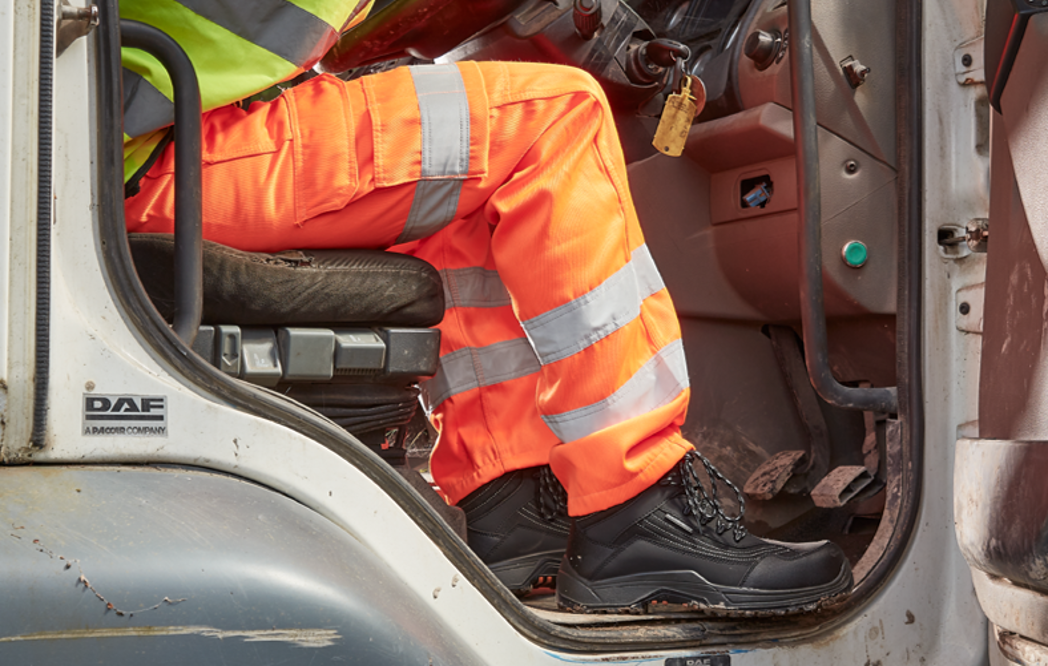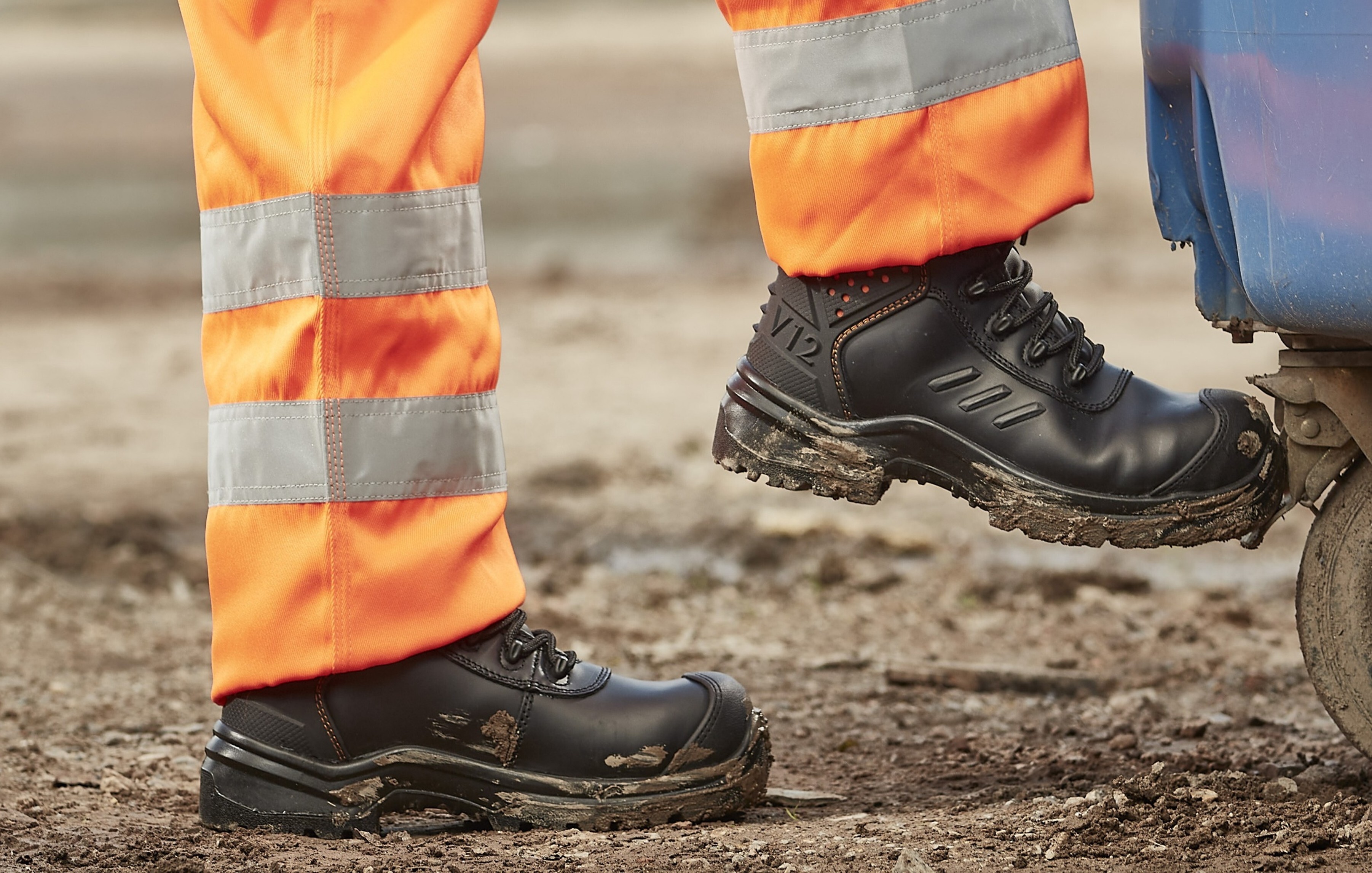Tough by nature, rugged and long-lasting. This is what we think of when we hear the words ‘safety footwear.’ On the other hand, ‘vegan-friendly’ is a term that hasn't always been linked with the same idea of strength and durability.This could be in part due to the heritage of leather. People have associated this material with toughness for hundreds of years. And with good reason: leather's tightly interlinked fibres make it naturally durable. And because of this, many assume that vegan-friendly work boots might not be as resilient as standard safety footwear. But this blog will show you how our vegan-friendly range is just as tough and able to protect the wearer as our leather safety boots. But first, let’s get our facts straight.
What makes a vegan-friendly work boot?
A vegan-friendly boot can’t contain any animal material. However, this doesn’t just mean leather: fur, hide, hair and shell are not allowed to feature in vegan products either. Even the adhesive that holds the boot together must be a specific type – it can't contain any gelatine (often used in adhesives) which is created using connective tissue and bones.
Vegan-friendly, full-strength
All V12’s footwear undergoes rigorous testing to ensure the highest standards of safety and strength - and that includes our vegan-friendly range. These quality tests do not consider whether the boot is leather, PU, microfibre or suede. They simply assess the boots’ ability to conform to the safety standards and requirements to obtain a UKCA marking and guarantee the wearer high-quality and consistently performing safety boots that can withstand even the toughest conditions.
These tests of durability and strength include:
- Abrasion resistance
- Tear strength
- Upper to sole bond strength
- Sole flex testing
- Waterproof flex testing
Leather or non-leather, for our footwear to pass these quality tests proves their exceptional durability, because they are seriously rigorous assessments.
In fact, during safety boot testing, it's not uncommon for synthetic uppers such as microfibre to outperform certain grades of leather in areas including bond strength (which tests the strength of the upper's attachment to the sole) and tear strength. This, added to the fact that synthetic uppers have good chemical-resistance and elasticity plus include durability features such as mildew resistance means that from a strength perspective, vegan-friendly boot material is anything but a compromise.
Want to see more of how we test our footwear at V12? Watch below.
Meet some of our vegan-friendly heavyweights

CAIMAN
This V12 bestseller is a seriously tough customer, featuring:
- A shock-absorbing, reinforced heel
- Highly durable scuff cap
- The IGS sole unit, made of exceptionally durable rubber
- Protective woven fibre midsole
- A highly breathable waterproof lining
comet
This safety low-cut might be vegan-friendly, but it's packed with protection, including:
- An anti-abrasion scuff cap
- ESD protection
- Durable lining
- A long-lasting energy-return ETPU midlayer
 octane
octane
This metal-free hiker is vegan-friendly, but it's a seriously strong boot, boasting:
- A water-repellent material
- A chemical-resistant upper
- Full ESD compliance
- A heat-resistant IGSTM sole unit
Line these styles up next to our leather safety boot range, and they will be more than equal to the competition.
Vegan-friendly - and award-winning

In 2019, we received a PCIAW 'Best innovation in footwear’ award for our trainer and hiker range. The PCIAW (Professional Clothing Industry Association Worldwide) awards recognise exceptional Workwear and PPE from around the world, so to receive this accolade was wonderful.
The judges not only loved that the range comes in men's and women's fit and is so lightweight, but because they're vegan-friendly. And footwear does not win international workwear awards if it does not boast industry-leading safety. More evidence that vegan boots are not a safety compromise.
MORE MYTHS ...
In years gone by, some may have seen vegan footwear as uncommon or slightly niche, and as a result the perception might have been that they are far more expensive than boots made with a leather upper. Well thankfully, neither of those things are the case.
An article from i newspaper revealed that in 2018, the number of searches for vegan shoes and clothing went up by 200%, and according to Our Sporting Life, there are an estimated 3.9 million vegans in the UK. What is more, they reveal that younger people are by far the likeliest to be vegan in the UK, highlighting that while Veganism may have been less common a decade ago, it is growing – and only getting more common.
As a result of this increasing commonality, vegan footwear tends to be only slightly more expensive due to the upper. Leather substitute materials like microfibre can cost manufacturers more, because leather is a common and established industry with a large infrastructure, so the supply chain tends to be cheaper. But nevertheless, the price difference is minimal.
Take our best-selling vegan-friendly hiker boot Caiman. We crunched some numbers and worked out that its microfibre upper only makes it 5% more expensive than if it were leather, which works out at just over £3 more per pair for the customer.
Our vegan-friendly footwear is built to protect, no matter what the conditions, so click the button below and shop with confidence.






